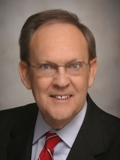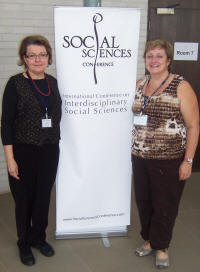|
Retirement reception for Markham Howe today
Reminder: Markham Howe, executive director, Public
Relations, will be hon ored
at a special reception today at 3 p.m. in Cooper Alumni Center. The
long-time advertising and marketing
strategist has announced his retirement from the university, effective
Tuesday, Aug. 31.
Howe, who has served at ASU since 1982 as a guest lecturer and
professional advisor to the Public Relations Student Society of America
(1982-current), instructor in Journalism (1994-97), Director of
University Relations (2002-08) and in the Executive Director position,
(2009-current), has been responsible for marketing, public relations,
advertising, media relations, internal/external communications and
strategic communications planning for the ASU-Jonesboro campus. He also
developed the concept for Inside ASU, the electronic newsletter for
faculty and staff. For details, see the
NewsPage release. ored
at a special reception today at 3 p.m. in Cooper Alumni Center. The
long-time advertising and marketing
strategist has announced his retirement from the university, effective
Tuesday, Aug. 31.
Howe, who has served at ASU since 1982 as a guest lecturer and
professional advisor to the Public Relations Student Society of America
(1982-current), instructor in Journalism (1994-97), Director of
University Relations (2002-08) and in the Executive Director position,
(2009-current), has been responsible for marketing, public relations,
advertising, media relations, internal/external communications and
strategic communications planning for the ASU-Jonesboro campus. He also
developed the concept for Inside ASU, the electronic newsletter for
faculty and staff. For details, see the
NewsPage release.
Finnicum and
Mathis present research
Dr. Paul A. Finnicum, Health Promotion, and Mitchell J.
Mathis, Physical Education, along with Dr. John S. Green from
Texas A and M and Dr. Jeffrey B. Zeiger from the Alternative Fuels
Institute, recently presented their research at the July 17-22
National Wellness Conference in Stevens Point, Wis. Their
presentation was "Technological
Tools of the Trade for Teachers.” The
purpose of the poster was to provide colleagues with insight
regarding the use of video, personal response devices, communication
strategies, course management software, test security, adaptive
release of materials, and managing discussion boards.
Dr. Reese, Dr. Warner, present
at international conference
Dr. Catherine C. Reese and Dr. Barbara Warner,
Political Science, recently presented their research, "Pay equity
for women: Why does the United States lag so far behind other
countries?," at the
Fifth
International Confere nce
on Interdisciplinary Social Sciences at the University of
Cambridge in Cambridge, England. Their August 5 presentation placed
the United States as a whole, and the states individually, in a
global context by analyzing women's pay relative to men's. The data
show American women earn an average of 77 cents on the dollar,
compared to men, in both the public and private sector.
The World Economic
Forum ranks the
United
States 31st among 134
countries in its
Global
Gender Gap Index, while the
Organisation for Economic Co-operation and Development finds
that it is mostly the European countries that have led in narrowing
the gender gap in median earnings for full-time employees. While
women still lag significantly behind men, the results show U.S.
women have made the most gains in the public sector, in the few
states that have had a major gender pay adjustment policy in the
last 25 years and, surprisingly, in "traditionalistic" states
(including Arkansas), which usually are described as having less
progressive policies. While few U.S. states are engaged in
evaluating their pay equity policies, state governments are more
active than the federal government on this issue. Drs. Reese and
Warner also visited sites significant to political
history, including seeing one of four remaining copies of the Magna
Carta from 1215 A.D. at Salisbury Cathedral and visiting a London
memorial to the suffragette Emmeline Pankhurst, who fought for
women's right to vote in England and helped inspire the suffrage
movement in the U.S. nce
on Interdisciplinary Social Sciences at the University of
Cambridge in Cambridge, England. Their August 5 presentation placed
the United States as a whole, and the states individually, in a
global context by analyzing women's pay relative to men's. The data
show American women earn an average of 77 cents on the dollar,
compared to men, in both the public and private sector.
The World Economic
Forum ranks the
United
States 31st among 134
countries in its
Global
Gender Gap Index, while the
Organisation for Economic Co-operation and Development finds
that it is mostly the European countries that have led in narrowing
the gender gap in median earnings for full-time employees. While
women still lag significantly behind men, the results show U.S.
women have made the most gains in the public sector, in the few
states that have had a major gender pay adjustment policy in the
last 25 years and, surprisingly, in "traditionalistic" states
(including Arkansas), which usually are described as having less
progressive policies. While few U.S. states are engaged in
evaluating their pay equity policies, state governments are more
active than the federal government on this issue. Drs. Reese and
Warner also visited sites significant to political
history, including seeing one of four remaining copies of the Magna
Carta from 1215 A.D. at Salisbury Cathedral and visiting a London
memorial to the suffragette Emmeline Pankhurst, who fought for
women's right to vote in England and helped inspire the suffrage
movement in the U.S.
School Psychology track
receives national designation
The School Psychology
track of the
Educational Specialist (Ed.S.) degree program in Psychology and
Counseling at Arkansas State University has most recently been
designated as “Nationally Recognized” by the
National Association of
School Psychologists (NASP). NASP serves as the Specialized Professional
Association (SPA) for the National Counsel for Accreditation of Teacher
Education (NCATE). The program had initially been designated as
“Nationally Recognized with Conditions” in 2009 following an initial
submission. NASP program approval/national recognition is a key indicator of quality
graduate education in school psychology, including comprehensive content
and extensive and properly supervised field experiences and internships,
as judged by trained national reviewers. NASP approval/national
recognition offers a number of advantages to programs, program
graduates, the profession of school psychology, and most importantly
to children, families, and schools. Dr. John D. Hall, Psychology and Counseling, coordinates
the track and is also chair of the departmental school psychology
committee. Dr. Hall noted that receiving the "Nationally Recognized"
designation is another significant milestone for the program,
department, college, and university. The school psychology committee
also consists of Dr. Amy Claxton, Psychology, and Dr. Craig Jones, Psychology and Counseling. Dr. Hall
expressed appreciation to the committee, other faculty in the department
and college, current students, past graduates, school psychology field
supervisors, and the schools for assisting the program in obtaining this
level of recognition. For details, contact
Dr. John D. Hall, ext. 3041, visit the
Specialist in Psychology and Counseling webpage, or see the
NewsPage release.
ASU supports licensed vendors only
All of the images representing Arkansas State University--including
the words "Arkansas State University"--have been trademarked by the
university and are protected marks. In order for a vendor to produce
or sell an item bearing one or more of the marks, that vendor must
be licensed through Collegiate Licensing Company, the university's
licensing representative. In an effort to protect licensed vendors,
encourage other vendors to become licensed, preserve the integrity
of university imagery, and most importantly, to operate in a legal
manner, Arkansas State University will purchase products bearing
university images exclusively from licensed vendors. The lists are
divided into three categories: Restricted, Local and
Standard. A Restricted license holder can sell
products to ASU for internal consumption only. Royalties are not
collected for these items. See
http://www2.astate.edu/a/advancement/pcs/RestrictedLicenses.pdf.
A Local license holder is just what the name implies. Sells
to campus and local buyers. Can produce products for up to five
in-state institutions. See
http://www2.astate.edu/a/advancement/pcs/LocalLicenses.pdf.
A Standard license holder is not limited to any particular
market and can sell to all buyers. See
http://www2.astate.edu/a/advancement/pcs/StandardLicenses.pdf.
If you have questions about standards, customized use of logos, or
need original logo materials, contact the office of
Publications and Creative Services
at 972-3400. If you have questions about licensing, contact
Brad Bobo at 972-3930.
Back to the top |

